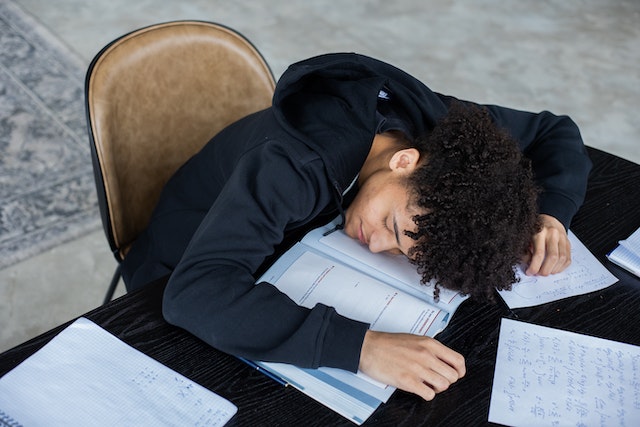8 Sleep Tips For Teens To Help Them Pass Their Exams

Teenagers are notorious for going to bed late and sleeping in even later. And whilst it’s true that teenage sleep requirements are different to adults, they still need a good amount of quality sleep in order to function at their best during school or college. Most teenagers need around 8 to 10 hours of uninterrupted sleep a night and it’s even more important they get this during exam time. So, with this in mind we have put together 8 sleep tips for teens to help them pass their exams.
1. Brain Dump
It can be really hard for teenagers to switch off when they’ve been revising all day. They’ve got tonnes of information buzzing around their head, which they’re worried about forgetting, and then there’s the whole exam stress thing going on too. It’s not exactly conducive to a good night’s sleep!
One of the best sleep tips for teens is for them to brain dump before going to bed. Brain dumping involves writing down any worries, stresses, or excess information that’s filling their head. This transferal process of head to paper, means that those thoughts are no longer trapped in their head, giving a sense of release and relief. They can then choose to close the cover of the notebook or screw up the piece of paper to send a message to the brain that they no longer need to worry or think these things.
This is also a good practice for them to do when they’re in the midst of taking their exams, as they may find themselves lying in bed ruminating over the exams they’ve taken that day, worrying about tricky questions, going over what they could have done better, thinking about what they might have done wrong. Dwelling on the what ifs keeps the mind active and raises stress levels at a time when they need to be unwinding and getting ready for sleep.
2. Get Organised
As well as revising, it’s important your teen has all the correct stationery they need for their exams. Items such as a clear pencil case, pens (that work!), calculator, ruler, eraser etc., are all vital bits of kit for sitting an exam. Check in advance that they have everything they need and then get them to pack their bag the night before each exam. This will prevent them from lying in bed doing a mental check list and hopefully stop them worrying about forgetting something.
Help them to create an equipment check list, which they can use to tick off each item as they pack it in their bag. As well as stationery, include things like a water bottle, tissues, snacks etc., that they can use either during the exam or immediately afterwards if they aren’t allowed those particular items in the exam hall. Most importantly of all, once the bag has been packed, put it downstairs. There’s a lot to be said for out of sight out of mind and by placing the bag downstairs it will mean one less thing for your teen to worry about and that should therefore help them get to sleep more easily.
3. Know when to stop
Everyone revises in different ways. Some people prefer to leave it to the last minute and cram it all in the night before for fear of forgetting things if they do it too far in advance. Whereas others like to meticulously plan out a revision timetable that starts weeks ahead of the exam. Whilst it’s not a particularly good idea to leave it last minute, we all need to find a way that works best for us.
What is important, no matter what revision technique you adopt, is to know when to stop. Which is easier said than done. Some teens struggle to stop themselves from revising, carrying on right up until the last minute, even pulling an all-nighter to cram every last bit of information in that they can. Late night and last minute cramming is never a good option and almost always counterproductive. It’s far more important to get a decent amount of sleep the night before an exam, than it is to stay up until all hours practicing past papers and going through flash cards. Help your teen establish a healthy sleep routine, which includes an end time. This will help them to set good habits, have a distinct separation between revision time and chill out time, and should also then lead to better sleep.
4. Have a Designated study area
This is a really important one to include in our sleep tips for teens, because it’s all too easy for teens to fall into the habit of revising on their beds. And whilst that might not sound as though it’s the worst thing in the world, it can lead to associations that can massively disrupt sleep.
Bedrooms, and beds in particular, should be associated with rest and sleep. When we start using it for other things, like studying, the brain starts to disassociate from sleep, and so it therefore becomes harder to switch the brain off when we do want to use the bed to sleep in.
Instead of revising on their beds, encourage your teen to either do it at a desk if they have one in their room, or find them a designated quiet space somewhere else in the house. This will help their brain to make the connection that this is the place to study, and this is the place for sleep.
5. Switch off from screens
The blue light from screens is one of the biggest reasons many of us struggle to achieve quality sleep. We all spend far too long looking at screens, but teenagers spend even more time on devices, especially when most of their revision will be done online.
In order to get a good night’s sleep, they really need to be switching off from all screens (yes, that includes phones!) about 1 to 2 hours before they plan on going to sleep. Encourage them to leave their devices downstairs, to get rid of any temptations. Or if you can’t convince them to do that, suggest that they put things on airplane mode to avoid getting notifications through the night, and to shut them away in drawers.
6. Make time for sleep
A revision timetable can be helpful in a number of ways. Obviously, it helps keep track of which subjects need revising and when, and we’ve already mentioned the importance of factoring in end times so that they know when to stop for the day. However, it’s also worth including something else on their timetable, which although they might roll their eyes about at first, will help them get the sleep they need at this mentally exhausting time.
Get them to schedule in bedtime on their planner. The easiest way for them to do this is to work out what time they need to get up in the morning, count back the number of hours they should sleep for (remember we said teens need about 8 to 10 hours) and then add on another half an hour to account for actually falling asleep. It doesn’t need to be absolutely set in stone, but the simple act of writing down a time for bed will prepare them for this cut off point and help them to switch off for the night.
If you have a teen who struggles to get to sleep, encourage them to develop a sleep routine before bed that includes things like having a bath, meditating, or listening to pink noise. This will help them to make the association of these acts meaning it is now time to sleep, and it will also relax their body and mind into a more restful state.
7. Watch what you eat and when
Teenagers are hungry creatures. And they also eat at very strange times of day. Which means they can often be found raiding the fridge late at night. Eating late into the evening is never good if you want a good night’s sleep, as the body needs time to digest the food properly. All the time that the body is digesting this food, means it is working rather than resting.
Cook healthy family meals, with bigger portions for hungry teens, that are eaten no later than 7pm at night. Include tryptophan rich foods, like turkey, milk, bananas, and walnuts, as these help the body to produce melatonin, a chemical that helps us sleep. If they moan that they’re hungry later on in the evening, a small snack of a glass of milk and a handful of walnuts or almonds is good.
8. Limit caffeinated drinks
And in relation to what your teen is consuming, it’s really important to limit the amount of caffeine that they’re having to ensure they sleep well ahead of an exam. Most of the teenagers we know are obsessed with energy drinks, some of which contain double the amount of caffeine of a standard cup of coffee. Everyone has varying levels of caffeine tolerance, but even so it is wise to avoid all sources of caffeine (this also includes tea, chocolate and some fizzy drinks) after 3pm.
We know what they’ll be thinking… that if they drink plenty of caffeine, they’ll be able to revise for longer, staying up late into the night, cramming for an exam the next day. But as we’ve already said, this is hugely counterproductive and not something we would recommend if you want your teen to pass their exams and get the grades they’re capable of.
Final Thoughts
We really hope these sleep tips for teens will help them to feel refreshed, alert, and ready to pass their exams with flying colours. As parents, we want to arm them with the tools they need to get through this stressful period as smoothly as possible. After all, we can’t take the exams for them, but we can at least help them to navigate their way through it so that they can get the results they are hoping for.






